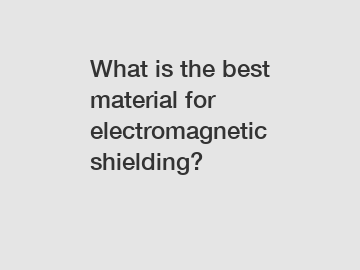What is the best material for electromagnetic shielding?
What is the Best Material for Electromagnetic Shielding?
In today's era of advanced technology and electronic devices, electromagnetic shielding has become increasingly important. Electromagnetic interference (EMI) can disrupt the proper functioning of sensitive electronic equipment, leading to malfunctions, data corruption, and even potential safety hazards. To mitigate these issues, electromagnetic shielding materials are utilized to prevent the transmission of electromagnetic waves. But with numerous materials available, which one is the best for electromagnetic shielding? Let's explore some popular options.
1. Conductive Metals: A Classic Choice.

The most common and effective materials for electromagnetic shielding are conductive metals. Metals such as copper, aluminum, and nickel have strong electrical conductivity, making them excellent choices for blocking and diverting electromagnetic waves. Copper, in particular, is widely used due to its high conductivity and cost-effectiveness. These metals create a conductive barrier that prevents electromagnetic waves from penetrating or escaping the shielded area.
2. Metal Mesh and Foil: Versatile and Easy to Use.
Metal mesh and foil are variations of conductive metals that are commonly employed as electromagnetic shielding materials. Metal mesh consists of a grid-like pattern of wires, while metal foil is a thin sheet of metal. Both options provide a flexible and versatile solution that can be easily incorporated into electronic devices, cables, and enclosures. Metal foil, often made of copper or aluminum, is particularly suitable for wrapping around sensitive components to create an enclosed shield.
3. Conductive Carbon-Based Materials: Lightweight and Durable.
Conductive carbon-based materials, such as carbon fiber and conductive polymers, have gained popularity in recent years due to their lightweight and durable nature. Carbon fiber composites possess excellent electromagnetic shielding properties while offering high strength and resistance to corrosion. These materials are particularly useful in applications where weight reduction and mechanical strength are crucial, such as aerospace and automotive industries.
4. Conductive Fabrics: A Blend of Functionality and Comfort.
For applications where flexibility, comfort, and aesthetics are important, conductive fabrics have emerged as a viable option for electromagnetic shielding. Specially designed fabrics, woven with conductive materials such as silver or nickel-coated fibers, can provide effective shielding while maintaining flexibility and breathability. Conductive fabrics are often utilized in garments, curtains, and other textiles to shield against electromagnetic radiation.
Closing Paragraph:
In conclusion, selecting the best material for electromagnetic shielding depends on various factors such as the intended application, cost, durability, and ease of use. Conductive metals like copper and aluminum remain popular choices due to their effectiveness and affordability. Metal mesh, foil, and conductive carbon-based materials offer versatility and lightweight options. Conductive fabrics provide a unique blend of functionality and comfort. With the rapid advancement of technology and increasing reliance on electronic devices, the importance of electromagnetic shielding cannot be understated. If you need assistance or further information on selecting the appropriate shielding material for your specific needs, please do not hesitate to contact us.
[Contact us for more information or assistance on electromagnetic shielding materials.].
If you are looking for more details, kindly visit is polyester metal, emf protection canopy, china thermal conductive fabric factory.
224
0
0

Comments
All Comments (0)